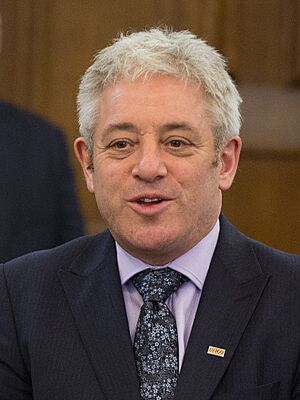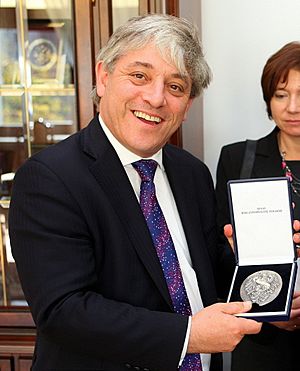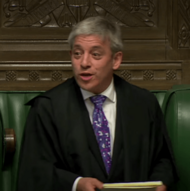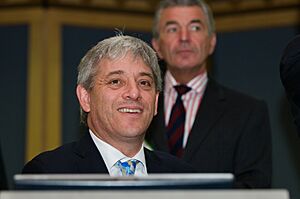John Bercow facts for kids
Quick facts for kids
John Bercow
|
|
|---|---|

Bercow in 2018
|
|
| Speaker of the House of Commons of the United Kingdom |
|
| In office 22 June 2009 – 4 November 2019 |
|
| Monarch | Elizabeth II |
| Prime Minister | Gordon Brown David Cameron Theresa May Boris Johnson |
| Preceded by | Michael Martin |
| Succeeded by | Lindsay Hoyle |
| Shadow Secretary of State for International Development | |
| In office 10 November 2003 – 8 September 2004 |
|
| Leader | Michael Howard |
| Preceded by | Caroline Spelman |
| Succeeded by | Alan Duncan |
| Shadow Chief Secretary to the Treasury | |
| In office 18 September 2001 – 23 July 2002 |
|
| Leader | Iain Duncan Smith |
| Preceded by | Oliver Letwin |
| Succeeded by | Howard Flight |
| Member of Parliament for Buckingham |
|
| In office 1 May 1997 – 4 November 2019 |
|
| Preceded by | George Walden |
| Succeeded by | Greg Smith |
| Chancellor of the University of Essex | |
| In office 22 July 2017 – 12 November 2021 |
|
| Vice Chancellor | Anthony Forster |
| Preceded by | Shami Chakrabarti |
| Succeeded by | (vacant until 2023), Sarah Perry (2023–) |
| Chancellor of the University of Bedfordshire | |
| In office 25 July 2014 – June 2017 |
|
| Vice Chancellor | Bill Rammell Rebecca Bunting |
| Preceded by | The Baroness Howells of St Davids |
| Succeeded by | Sarfraz Manzoor (2023–) |
| Member of Lambeth London Borough Council for St Leonard's ward | |
| In office 9 May 1986 – 4 May 1990 |
|
| Personal details | |
| Born |
John Simon Bercow
19 January 1963 Edgware, Middlesex, England |
| Political party | None |
| Other political affiliations |
|
| Spouse |
Sally Illman
(m. 2002) |
| Children | 3 |
| Alma mater | University of Essex (BA) |
| Signature |  |
John Simon Bercow (born 19 January 1963) is a former British politician. He is best known for serving as the Speaker of the House of Commons from 2009 to 2019. During his time as Speaker, he became famous around the world for his loud calls of "Order! Order!"
Bercow was a Member of Parliament (MP) for the town of Buckingham from 1997 to 2019. He was first a member of the Conservative Party. When he became Speaker, he had to leave his party and become independent, as the Speaker must be neutral.
After he left Parliament in 2019, he joined the Labour Party in 2021 but was suspended a year later.
Contents
Early Life and Education
John Bercow was born in Edgware, Middlesex, England. His father was a taxi driver. His family was Jewish, and their original surname was Berkowitz before it was changed to Bercow.
As a young boy, he was a very good tennis player. He even appeared on the children's TV show Crackerjack! in 1975.
Bercow studied government at the University of Essex and graduated in 1985. When he was young, he was part of a right-wing group in the Conservative Party. He later said that joining this group was "utter madness" and that he regretted his views from that time.
After university, he worked in banking and for a public relations company. He also taught public speaking to other young Conservatives.
Political Career
Early Political Steps
In 1986, at the age of 23, Bercow was elected as a councillor in Lambeth, London. He was the youngest deputy group leader in the country at the time.
In 1995, he became a special adviser to government ministers. This meant he gave advice to important politicians like Jonathan Aitken and Virginia Bottomley.
Becoming a Member of Parliament

After two unsuccessful attempts to get into Parliament, Bercow was elected as the MP for Buckingham in 1997. He won with a large number of votes.
In Parliament, he quickly became known for being a skilled and sharp speaker. He was given important roles in the Conservative Party, which was in opposition at the time. This included being the Shadow Chief Secretary to the Treasury.
In 2002, he disagreed with his party's leadership on a new law about adoption. The law allowed unmarried couples, including same-sex couples, to adopt children. Bercow believed MPs should be allowed to vote based on their own conscience, so he voted for the law and resigned from his senior role.
Over time, Bercow's political views began to change. He started to support more liberal ideas, and there were even rumors that he might switch to the Labour Party.
Speaker of the House of Commons
The Speaker is the person who keeps order in the House of Commons. They must be fair to all political parties and make sure debates follow the rules.
How He Became Speaker
In 2009, the Speaker at the time, Michael Martin, resigned. Bercow decided to run for the job. He said he wanted to give more power to ordinary MPs and make Parliament stronger.
On 22 June 2009, Bercow was elected as the 157th Speaker. He was the first Jewish Speaker and the first to be elected using a new voting system. As soon as he was elected, he left the Conservative Party to be politically neutral.
A Modern Speaker
Bercow was known for his modern style. He chose not to wear the traditional court robes that previous Speakers had worn.
He became very well-known for his loud and unique way of shouting "Order! Order!" to quieten down noisy MPs. This made him famous not just in the UK, but around the world.
One of his important projects was supporting the United Kingdom Youth Parliament. He allowed young people to hold their annual debate in the House of Commons chamber, making them the only group besides MPs to do so.
Guiding Parliament Through Brexit
Bercow's time as Speaker is most remembered for his role during the Brexit debates. After the UK voted to leave the European Union in 2016, Parliament had many difficult and passionate debates about how to proceed.
Bercow had to make many important decisions about which topics could be debated and voted on. Some of his rulings were controversial. For example, in March 2019, he stopped the government from having a third vote on its Brexit deal, saying it was against Parliament's rules to vote on the same issue repeatedly.
His actions during this time were seen as giving more power to MPs to challenge the government. While some praised him for defending Parliament, others in the government felt he was not being neutral.
Life After Parliament
Retirement and New Roles
On 9 September 2019, Bercow announced he would retire as Speaker and as an MP. He officially left Parliament on 4 November 2019, after serving for 10 years as Speaker. He was the longest-serving Speaker since World War II.
After leaving politics, Bercow wrote an autobiography called Unspeakable. He also took on roles at several universities, including becoming a professor of politics at Royal Holloway, University of London.
In 2021, he announced that he had joined the Labour Party. He said he did this because he supported their values of equality and social justice.
Complaints About His Behavior
In 2018, while he was still Speaker, some of Bercow's former staff members made complaints about his behavior. They said he had bullied them at work. Bercow denied these claims.
After he left Parliament, a formal investigation was launched. In 2022, an independent panel looked at the evidence and found that Bercow had been a "serial bully."
Bercow disagreed with the findings and called the investigation unfair. As a result of the report, he was suspended from the Labour Party and banned from ever having a pass to enter the Parliament buildings.
Personal Life
Bercow married Sally Illman in 2002, and they have three children. He is a huge fan of Arsenal F.C. and has a season ticket. He is also a lifelong tennis fan and wrote a book about the greatest male tennis players.
Images for kids
Honours
| Country | Date | Appointment | Post-nominal letters |
|---|---|---|---|
| 2009–present | Member of His Majesty's Most Honourable Privy Council | PC |
Scholastic
- University degrees
| Location | Date | School | Degree |
|---|---|---|---|
| 1985 | University of Essex | First-class honours Bachelor of Arts (BA) in Government |
- Chancellor, visitor, governor, rector and fellowships
| Location | Date | School | Position |
|---|---|---|---|
| 2014– | University of Bedfordshire | Chancellor | |
| 18 July 2017 – 12 November 2021 | University of Essex | Chancellor | |
| 27 January 2017 – present | University of Manchester | Honorary Professor | |
| 4 November 2019 – present | Birkbeck, University of London | Fellowship | |
| 24 January 2020 – present | Royal Holloway, University of London | Professorship of Politics |
- Honorary degrees
| Location | Date | School | Degree |
|---|---|---|---|
| 2010 | University of Essex | Doctor of the University (D.Univ) | |
| 16 March 2013 | University of Buckingham | Doctor of Laws (LL.D) | |
| 23 January 2014 | De Montfort University | Doctorate | |
| 30 January 2014 | City, University of London | Doctor of Science (D.Sc.) |
Freedom of the City
| Location | Date | Award |
|---|---|---|
| 4 July 2016 | Freedom of the City of London
(London) |
See also
 In Spanish: John Bercow para niños
In Spanish: John Bercow para niños
 | Calvin Brent |
 | Walter T. Bailey |
 | Martha Cassell Thompson |
 | Alberta Jeannette Cassell |




